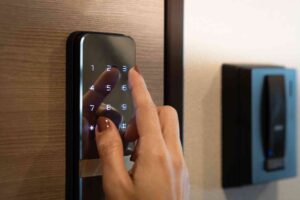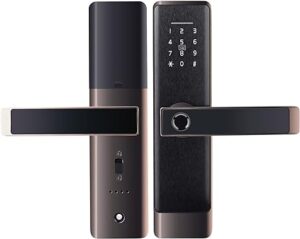In the age of smart homes, smart locks have quickly become a popular choice for upgrading home security. These high-tech devices promise convenience and control, but how do they measure up to the tried-and-true traditional locks when it comes to actual security? In this blog, we’ll delve into the key differences, advantages, and potential vulnerabilities of smart locks and traditional locks to help you make an informed decision for your home or business.
What Are Smart Locks and Traditional Locks?
Smart Locks
Smart locks are electronic devices that integrate with home automation systems or smartphones. They often allow remote locking and unlocking, provide activity logs, and even integrate with voice assistants like Alexa or Google Assistant.

Traditional Locks
Traditional locks are mechanical locking mechanisms, typically operated by a physical key. These include deadbolts, pin tumbler locks, and mortise locks, among others.
While both serve the fundamental purpose of securing your property, their designs and functionalities set them apart in significant ways.
Security Comparison: Smart Locks vs. Traditional Locks
Strength Against Physical Attacks
Traditional locks, especially high-quality deadbolts, are robust against physical force. Their durability is tried and tested, and they often come with reinforced strike plates to resist break-ins.
Smart locks, on the other hand, often incorporate the same physical locking mechanisms as traditional locks but may include additional reinforcements. However, the inclusion of electronic components can create potential vulnerabilities if the materials used are subpar.
Resistance to Picking and Bumping
Traditional locks can be susceptible to picking or bumping if they lack advanced pin configurations. High-security models like Medeco or Mul-T-Lock have additional safeguards against these techniques.
Smart locks are typically less prone to mechanical picking since their operation doesn’t rely on physical keys. However, if they feature a key override, this vulnerability could persist unless the backup key system is well-designed.
Protection Against Digital Threats
This is where smart locks diverge significantly. Smart locks introduce new concerns, including:
- Hacking: Poor encryption or outdated firmware can expose the lock to hacking attempts.
- Battery Failure: If the lock’s battery dies, it could leave you locked out unless there’s a manual override.
- Signal Interception: Smart locks relying on Bluetooth or Wi-Fi might be susceptible to signal interference or replay attacks.
Traditional locks, being purely mechanical, are immune to digital vulnerabilities, offering a level of simplicity that appeals to security-conscious users.
Advantages of Smart Locks
Convenience
Smart locks allow remote access, meaning you can lock or unlock your door from anywhere using a smartphone app. This is particularly useful for letting in guests or service providers without needing a physical key.
Activity Monitoring
Many smart locks provide logs showing who accessed the door and when. This is an added layer of security, especially for rental properties or businesses.
Integration with Smart Home Systems
Smart locks can be part of a broader home automation system, allowing you to set routines or integrate them with surveillance cameras.
Advantages of Traditional Locks
Reliability
With no reliance on electronics, traditional locks function without concern for power failures or software glitches.
Proven Durability
High-quality traditional locks have a long lifespan and are difficult to tamper with when installed correctly.
Cost-Effective
Traditional locks are generally more affordable than smart locks, making them a practical choice for those on a budget.

Which One Should You Choose?
Consider a Hybrid Approach
For those seeking the benefits of both systems, many smart locks include a traditional keyway as a backup. This provides the convenience of smart access with the reliability of a mechanical lock.
Evaluate Your Needs
- For tech-savvy homeowners: A smart lock might be the way to go, especially if you value remote access and monitoring.
- For security-focused users: A high-quality traditional lock, or a hybrid model, might offer greater peace of mind.
- For businesses: Smart locks with access logs can enhance security and accountability.
Conclusion
Smart locks and traditional locks each have their strengths and weaknesses. While smart locks bring unmatched convenience and advanced features, they introduce potential digital vulnerabilities. Traditional locks, on the other hand, are reliable and straightforward but lack the flexibility of modern technology.
To achieve the best security, consider combining the strengths of both systems by using a hybrid lock or pairing a smart lock with additional security measures such as cameras or alarms. Remember, the ultimate security depends not just on the lock but on its installation, the materials used, and the overall security system in place.
